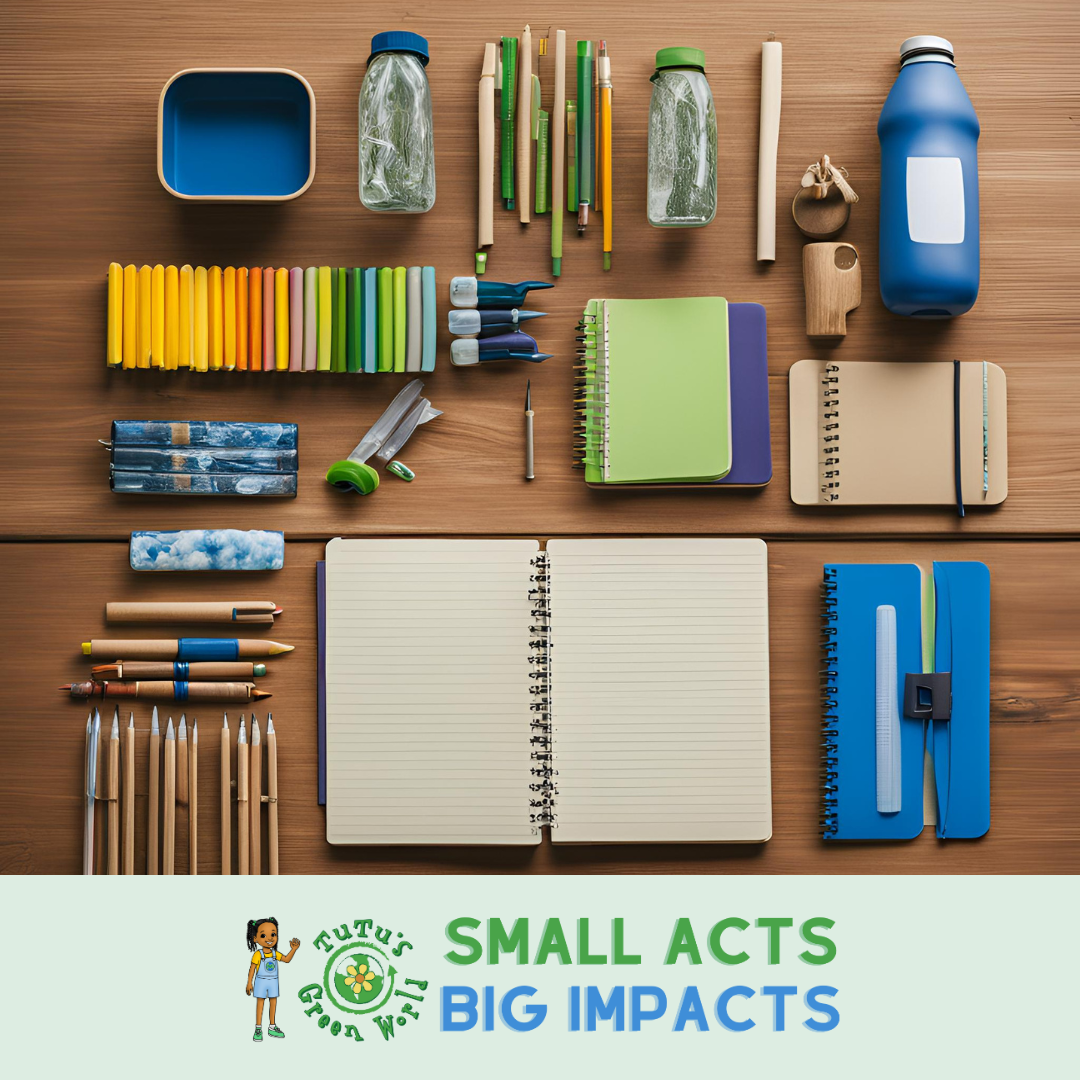
Sustainable School Supplies - It’s Not Too Late!
As the school year kicks off, many parents, students, and teachers rush to prepare, grabbing school supplies without much thought about their environmental impact. But even if the school year has already started, it’s not too late to shift towards more sustainable choices for back-to-school supplies!
By being mindful of what we buy, we can reduce waste, support eco-friendly practices, and teach the next generation the importance of sustainability. Here are five practical ways to make your school supply list more sustainable, starting today.
1. Choose Reusable and Durable Products
Instead of purchasing cheap supplies that are likely to break or wear out quickly, opt for durable and reusable items. High-quality products last longer, reducing the need for replacements throughout the year. Look for backpacks made from recycled materials, sturdy stainless-steel water bottles, or mechanical pencils that can be refilled with lead.
Durable products may cost more upfront, but they pay off in the long run by reducing both waste and your expenses over time.
2. Buy Recycled or Upcycled Paper Products
Notebooks, folders, and paper are essential supplies for any student. Choosing items made from recycled materials is a simple and effective way to reduce your environmental footprint. Many brands offer recycled notebooks, printer paper, and file folders that are just as functional and affordable as conventional options.
Consider also looking for upcycled options—products made from materials that would otherwise be thrown away. Some companies produce notebooks, for example, from recycled cardboard or even old textiles.
3. Repurpose Supplies from Last Year
Before heading to the store, take a moment to assess what you already have. Many items, like binders, pencil cases, or notebooks that still have usable pages, can be reused for the new school year. Repurposing or "shopping at home" can save money and reduce the demand for new products, which ultimately cuts down on manufacturing waste.
Get creative—old notebooks with a few used pages can be refreshed with a DIY cover, giving them a new look and purpose!
4. Opt for Non-Toxic, Eco-Friendly Supplies
Many school supplies, from markers to glue, contain toxic chemicals that can be harmful to both kids and the environment. To minimize exposure to harmful substances, choose non-toxic, eco-friendly alternatives.
Look for brands that offer non-toxic crayons, biodegradable pens, and plant-based glues. Eco-friendly supplies are often clearly labeled, and more companies are offering these options as awareness of sustainability grows.
5. Support Second-Hand and Local Stores
Second-hand stores, local markets, or even online platforms like eBay can offer excellent deals on school supplies. Buying second-hand reduces the demand for new products and gives items a second life, preventing them from ending up in a landfill.
Supporting local businesses also cuts down on the carbon footprint associated with shipping items from far away and helps to boost your local economy. Plus, you may find unique items that can add a bit of flair and individuality to your school supplies.
The Bigger Picture: Teaching Sustainability to Future Generations
Choosing sustainable back-to-school supplies is more than just an eco-friendly decision; it’s an opportunity to teach children the importance of mindful consumption. By involving them in the process—whether it's reusing last year’s supplies, opting for eco-friendly brands, or shopping second-hand—they can learn that small actions can have a significant impact.
It’s never too late to make changes that benefit both the planet and your wallet. So, as you prepare for this school year, consider these sustainable options and set an example for a greener future.
Also in TuTu's Green Stuff Blog

Earth Day 2025: “Our Power, Our Planet” – Uniting for a Renewable Future
Every April 22nd, Earth Day calls on us to pause, reflect, and recommit to protecting the planet we call home. What started in 1970 as a grassroots movement has grown into a global call to action, reaching over a billion people in more than 190 countries. This year’s Earth Day theme, “Our Power, Our Planet,” reminds us of a profound truth: that we hold the power—individually and collectively—to shape the future of our world.

Celebrate National Gardening Day: Cultivating a Greener Future, One Garden at a Time
Every year on April 14th, National Gardening Day reminds us to dig in, get our hands dirty, and reconnect with the earth. It’s more than a celebration of soil, seeds, and sunshine—it’s an invitation to grow something meaningful. In recent years, National Gardening Day has evolved from a backyard pastime into a growing movement tied deeply to sustainability, resilience, and environmental awareness. As climate concerns continue to rise, gardening offers a beautiful and practical way to contribute to a healthier planet, starting in our own backyards.

Rosalind Brewer: A Leader Who Believes in Doing the Right Thing
Have you ever wondered what it takes to be the boss of a big company? Or how someone can go from growing up in a small neighborhood to leading thousands of people? Let us tell you the story of Rosalind Brewer—a kind, smart, and determined woman who became one of the most powerful business leaders in the world. And she did it by always believing in working hard, helping others, and standing up for what’s right.
